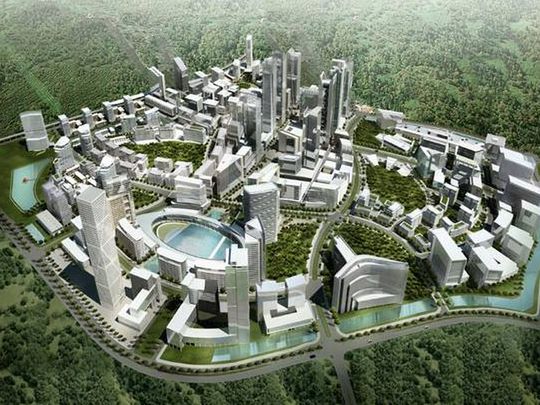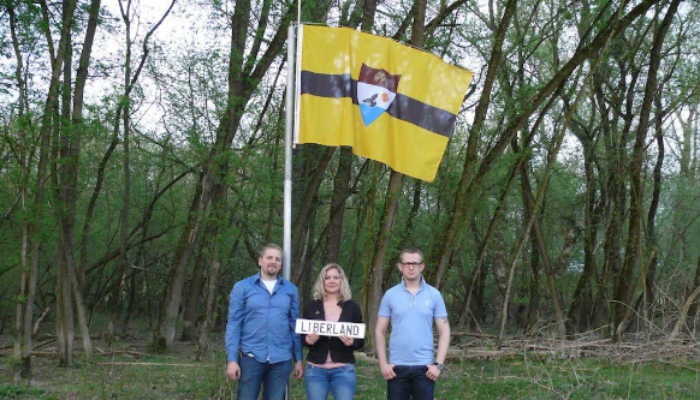
 If Silicon Valley Libertarians collectively vomited over a three-square-mile space, the result might resemble the blueprint for Liberland, a planned micronation of 400,000 that aims to be situated on a legally disputed dot of land between Serbia and Croatia. The not-yet-a-nation is the brainchild of right-wing Czech politician Vít Jedlička, who enlisted architects and economists to focus on sustainability and optional tariffs. The experimental mini-country, which will almost definitely never come to fruition, is committed to being a car-less, algae-powered tax haven. If on the off chance it actually was realized to some degree, it would likely be a clusterfuck.
If Silicon Valley Libertarians collectively vomited over a three-square-mile space, the result might resemble the blueprint for Liberland, a planned micronation of 400,000 that aims to be situated on a legally disputed dot of land between Serbia and Croatia. The not-yet-a-nation is the brainchild of right-wing Czech politician Vít Jedlička, who enlisted architects and economists to focus on sustainability and optional tariffs. The experimental mini-country, which will almost definitely never come to fruition, is committed to being a car-less, algae-powered tax haven. If on the off chance it actually was realized to some degree, it would likely be a clusterfuck.
Excerpts from two articles follow, the first from Adele Peters new Fastcoexist piece, the latter from Daniel Nolan’s 2015 Guardian report.
To save space (the whole country is only three square miles) but allow the city to grow, neighborhoods are stacked in layers.
“I envisioned an intimate-scale city,” says Raya Ani, director of RAW-NYC, the architecture firm that created the winning design in response to a competition hosted by Liberland. Rather than build massive skyscrapers to house the 400,000 people who hope to live in the new city, each layer includes smaller, densely arranged buildings that allow sunlight to reach the street.
The underside of each platform is covered with algae—a genetically engineered version that doesn’t require sunlight to grow, and that can be converted into power. “The horizontal surface layer seemed to be the perfect home to grow algae that could power the city,” she says.The design also includes solar power, and a waste-to-energy system that converts any organic waste to biogas for cooking. Other trash is incinerated to create electricity.
In the design, the neighborhoods are clustered around transit, with libraries, sports arenas, and other public areas no more than a 10-minute walk from public transit. The city is also covered with bike and pedestrian paths—with zero cars.
“It’s a very walkable city where you could reach any point at a reasonable time whether you use the train or you walk,” says Ani.•
From the Guardian:
In the week since Liberland announced its creation and invited prospective residents to join the project, they have received about 200,000 citizenship applications – one every three seconds – from almost every country in the world.
Prospective citizens are also offering Liberland their expertise in areas from solar power and telecoms to town planning and coin minting. “There is a spontaneous ordering taking place,” Jedlicka says. “People have planned the whole city in three days and others really want to move in and invest … what seemed like a dream now really looks possible.”
Liberland’s only stipulations are that applicants respect individual rights, opinions and private property, and have no criminal record or Nazi or Communist party background.
Jedlicka says: “The model citizen of Liberland would be [American founding father] Thomas Jefferson, which is why we established the country on his birthday. Citizens will be able to pursue happiness and this is the place where we can make this happen.”
Crucial to this flourishing, he believes, is fiscal policy. Liberland is the dream of a man whose earlier membership of the Czech Civic Democratic party and current loyalty to the Free Citizens party puts him firmly on the right. Staunchly anti-EU, Jedlicka says he has “pretty close relations” with the Swiss People’s party and “will meet with British politicians to discuss Nigel Farage’s plans to leave the EU”.
“Taxation will be optional and people will only finance specific development projects,” says Jedlicka. “We have to see how the foreign ministries react and we need to explain to them the kind of prosperity we can bring to the region. It will bring in money from all over the world: not only to Liberland, which would be a tax haven, but to the whole area. We could turn this area into a Monaco, Liechtenstein or Hong Kong.•
Tags: Adele Peters, Daniel Nolan, Vít Jedlička
